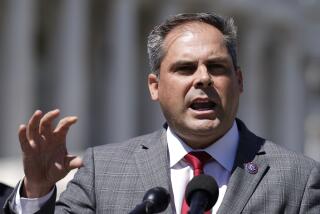Fiscal cliff is a trap Republicans have set for themselves
Saturday night, I attended a wonderfully raucous dinner party where politics was as much a main course as the grass-fed beef. New York Times columnist Tim Egan – a good friend and a superb writer – was sitting two plates down the table from me and, late in the evening, he was expressing disbelief that members of the U.S. Congress would be crazy enough to drive the country off a “fiscal cliff.”
Egan made the point that families dependent on unemployment checks, as well as other needy Americans, will suffer unless a budget agreement forestalls the huge federal budget cuts and tax increases that are primed to kick in on Jan. 1. I raised my voice (there were plenty of raised voices throughout the meal) to argue that members of Congress will take the risk anyway believing that most of the bad things that might happen can be undone even after the deadline has passed.
Tim and I then got caught up framing an analogy based on the climactic scene in the movie, “Thelma and Louise.” If members of Congress can willingly crash and still repair the damage, would it be like rewinding the film after the car flew off the cliff but before it hit the hard ground below? Would they land, but softly on a big, deflating air cushion? Between Rep. John Boehner and President Obama, who is Thelma and who is Louise?
PHOTOS: Top of the Ticket cartoons
Thinking about it now, free of the influence of excellent red wine, it strikes me that the fiscal cliff metaphor has skewed the way people look at the issue, just as the too-easily mocked term “global warming” misleads people into simplistically thinking only of hotter days, not extremes of temperature and weather, rising seas and parched land. What we face at the start of 2013 is not a cliff but a slippery slope. The government will not immediately shut down, nor will defense industries go under or national parks be sold to mining companies. Cuts will phase in gradually and will undoubtedly be scaled way back once members of Congress and the president agree to do so. It is all a question of timing and who gives up what.
At its heart, the current impasse over a budget deal comes down to the GOP’s unwillingness to let George W. Bush-era tax breaks for the wealthiest 2% of Americans expire. Obama insists this has to happen and House Speaker Boehner says it will not. The obvious weakness in the Republican position is that the Democrats know they will get what they want – more revenue from the wealthy – either because the Republicans capitulate and make it part of a budget package before Jan. 1 or because that date arrives with no agreement and the tax cuts disappear automatically. This makes them strongly inclined to play hardball. The chairwoman of the Senate Budget Committee, Washington state’s Democratic Sen. Patty Murray, has made it clear she is willing to brave the fiscal cliff rather than do a deal with Republicans that, as she has said, “throws middle-class families under the bus” while, once again, rewarding the rich folks who have done so exceedingly well in recent decades.
Republicans have to know protecting the upper-income tax cuts is a lost cause, yet they are loath to deal them away. That would amount to raising taxes, something most Republicans have pledged never to do. Perversely, this gives them an incentive to postpone a deal until after the start of the year. They can claim they did not cave to Obama, while Grover Norquist will not be able to hold them accountable for the tax hike.
However, playing the game that way would waste the Republicans’ biggest bargaining chip. Right now, they could trade the rich people’s tax cut for major reductions in federal spending. That is the path to the best deal the Republicans can expect, but their leverage disappears at the end of the day on December 31.
PHOTOS: Top of the Ticket cartoons
When Republicans created the fiscal cliff as a means to force a grand bargain on the budget, they must have assumed Democrats would go soft in a game of chicken. Instead, it appears Obama, Murray and the Democrats have looked over the fiscal cliff and are not all that frightened by what they see. Politically speaking, the scariest thing at the bottom of that cliff is the trap Republicans have set for themselves.
More to Read
A cure for the common opinion
Get thought-provoking perspectives with our weekly newsletter.
You may occasionally receive promotional content from the Los Angeles Times.











